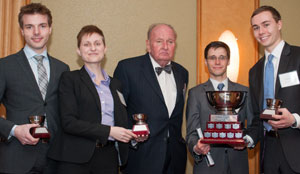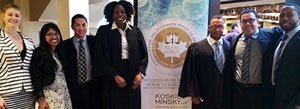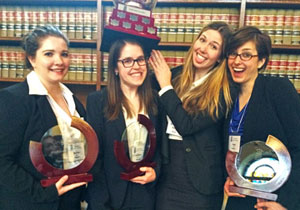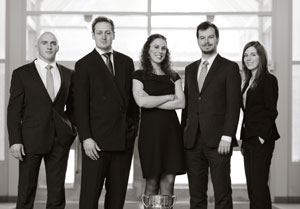As the school year comes to an end, law students will look back at all they have accomplished in 2014. A highlight for many will be the moots they participated in across the country. This year, they looked at issues ranging from religious freedom rights, the validity of police searches, and Ponzi scheme-related tax problems.
4Students has gathered results from this year’s competitions, which show a wide range of schools fared well when it was time to stand up and present their argument.
Bennett Jones Health Law Moot: This health law-related moot is held annually between the University of Calgary and the University of Alberta. This year, the teams debated a constitutional challenge to the Criminal Code prohibition on assisted suicide. It was held in Calgary on March 22.
First: University of Calgary
Second: University of Alberta
Bora Laskin Moot: The Laskin is a national bilingual moot dealing with administrative and constitutional law. It is named after the late Supreme Court of Canada chief justice Bora Laskin, one of Canada’s leading legal scholars and jurists. This year’s fictional case was
The Golden Voice Theatre v. Minister of Canadian Heritage and Official Languages, which dealt with the cancellation of funding for a theatre program. It was held Feb. 27–March 1.
First: Osgoode Hall Law School
Second: Laval University
Third: McGill University, University of Ottawa
Fourth: University of Toronto
Best factum: McGill University
Best pairs: Osgoode Hall Law School (Jonathan Silver and Maciej Lipinksi)
Spirit of the Laskin award: Université de Québec a Montréal
Canadian Client Consultation Competition: This competition is a simulated office consultation between two law students and a client. The students are evaluated on their ability to present the client with their options, explain the relevant laws, and assist them in reaching a solution. This year, it was held at Osgoode Hall Law School on Feb. 22–23.
Overall winner: Osgoode Hall Law School (Robin Nobleman and Anna Leggett)
This year’s winners represented Canada in Puerto Rico at the Louis M. Brown and Forrest S. Mosten International Client Consultation Competition in April, where the team advanced to the semifinals before being eliminated.
Chaitons LLP Corporate Restructuring Advocacy Competition: This was the third annual event for the Western University-based competition, held March 5. The competition focuses on appellate advocacy and, this year, looked at whether a stay of proceedings under the Companies’ Creditors Arrangement Act should be granted in the absence of evidence that a debtor company intends to propose a plan of compromise or arrangement to its creditors.
Best appellant team: Peter Howie and Carolyn McKeen (Western University)
Best respondent: Stephanie Marentette and David Price (Western University)
Outstanding advocacy as a 1L: Michael Barrett (Western University)
Clinton J. Ford Moot: This is an in-house appellate moot for University of Alberta law students. Teams debate a problem regarding either a criminal or constitutional law topic. This year, teams debated whether police should have the right to conduct warrantless road-side dog scent searches. It was held mid-March.
First: Lindsay Hoban and Mario Babic
Second: Pablo Retamozo Landeo and Curtis Steeves
Davies Ward Phillips & Vineberg LLP Corporate/Securities Law Moot: This competition requires students to debate issues in corporate and security law with senior practitioners from Toronto-based law firms. Students are tested on written and oral advocacy. This year, the event took place March 7-8.
First: University of Calgary (Mike Selnes, Alexander Watson, Delna Contractor, Steven Marshall and Jackie Johnson)
Second: University of Toronto (Kathleen Elhatton-Lake, Daniel Urquhart, Lauren Harper and Jim Robson)
Third: Osgoode Hall Law School (Wendy Sun, Douglas Judson, Liane Langstaff, Nicolas Francis and Evan Kenyon)
Top oralist: Alexander Watson (University of Calgary)
Second place oralist: Gautam Dhillon (University of Alberta)
Best factum: University of Toronto
 Donald G.H. Bowman National Tax Moot
Donald G.H. Bowman National Tax Moot: Canada’s first tax moot, named after the former chief justice of the Tax Court of Canada, is in its fourth year. This year, the case was
Johnston v. The Queen, which dealt with tax issues related to a Ponzi scheme. It was held Feb. 28 and March 1.
Overall winner: University of Toronto
Best advocate: Sheena Lessard (University of Toronto)
Best factum-appellant: Western University
Best factum-respondent: University of British Columbia
First-Year Appellate Competition Student Moot: This year’s competition for first-year Western University law students required teams to address the judgment in
R. v. Boudreault, which examines whether the risk of danger is an essential element of the offence of care or control under the Criminal Code. It was held March 10-12.
Winner: Michael Barrett
Finalists: Bonnie Clarke, Derrick Dodgson and Alex St. John
Harold G. Fox Intellectual Property Moot: The Fox Moot is named after one of Canada’s leading intellectual property scholars and advocates, Harold G. Fox. Now in its sixth year, the moot deals with issues related to IP laws. This year’s case was between Filter King Labs Inc. and AsterixObelix Pharma Inc., which deals with patent infringement over a technique used to identify kidney disease early in humans. It was held Feb. 21-22.
Winner: University of Ottawa (Nathan Piche and Laurel Hogg)
Dimock Stratton Award for mooting excellence in a non-graduating year: Laurel Hogg (University of Ottawa)
Gordon F. Henderson award for best factum: Appellant — Giantommaso Colaneri and Veronica Tsou (University of Ottawa); Respondent — Eric Leinveer and Sean Husband (University of Toronto)
Donald F. Sim award for best oralist: Laurel Hogg (University of Ottawa)
Second place oralist: Khalid Karim (University of Windsor)
Hicks Cup: The Hicks Cup requires students to argue, at an appellate level, constitutional or administrative law issues arising out of a recently decided case in the field of labour and employment law. Arguments are heard by tripartite panels comprised of Hicks Morley lawyers. The aim is to provide students in all years of law school with an opportunity to develop their oral advocacy skills. It was held at Hicks Morley’s Toronto office on March 28.
First: Queen’s University (Adam James and Alyssa LeBlanc)
Second: Western University (Nicole Buchanan and Amy Marcen-Gaudaur)
Hockey Arbitration Competition: This sports law moot is now in its second year. It is a salary arbitration competition modeled on the procedures used in the National Hockey League. Created by U of T students, its aim is to give students an opportunity to refine their advocacy skills and gain experience in the sports law industry. It was held on Oct. 18-19, 2013.
First: University of Windsor (Edward Snetsinger and Pat Ganley)
Second: Osgoode Hall Law School (Adam Theofanidis and Justin D’Aloiso)
 Julius Alexander Isaac Diversity Moot
Julius Alexander Isaac Diversity Moot: Each year, the Black Law Students’ Association of Canada organizes this moot, named after the late chief justice of the Federal Court of Appeal, Julius Alexander Isaac, the first black judge to sit on a federal court in Canada. It focuses on equity and diversity issues, including diversity law, human rights, and equity issues. Held on Feb. 2, this year’s problem focused on
Johnson v. General Motors of Canada Ltd., which examined the role racism played in the termination of a General Motors employee.
Winner: Osgoode Hall Law School (Busayo Ayodele and Richard Lanns)
Best factum: Jeff Hernaez and Zorn Pink (Osgoode Hall Law School)
Best oralist: Busayo Ayodele (Osgoode Hall Law School)
Kawaskimhon Moot: The University of Toronto hosted the 2014 Kawaskimhon Aboriginal Moot on March 7-9. In Cree, Kawaskimhon means, “speaking with knowledge.” The moot focuses on aboriginal issues and is open to aboriginal and non-aboriginal law students across Canada. The objective of the moot is to reach a consensus on the problem at hand, which was loosely based on the Ring of Fire development in Northern Ontario. This year’s moot had teams from 15 different Canadian law schools that represented various First Nation parties, the province, and a resource company, with an aim to enter into an Impact Benefit Agreement. The moot is non-competitive and conducted in a circle format.
Lenczner Slaght-CBA Gale Cup: This bilingual moot is held annually in Toronto. This year, the competition took place on Feb. 21-22 and addressed the issue of accommodating a religious belief, while ensuring the accused receives a fair trial.
First: Sherbrooke University
Second: Université du Québec à Montréal
Third: Osgoode Hall Law School
Fourth: Western University
Top oralist: University of Toronto
McLachlin prize for best female mooter: Heather Doi (University of British Columbia)
Peter Cory prize for best factum: University of British Columbia
Mathews Dinsdale & Clark National Labour Arbitration Competition: This moot was created to explore distinctive issues in labour law advocacy. The event holds a simulated grievance arbitration hearing before tri-partite panels. It was held Jan. 24–26 in Toronto.
First: University of British Columbia (Megan Coyle and Brendan Dawes).
Second: Queen’s University (Jessica Liu and Angela Wiggins)
 Ontario Trial Lawyers’ Association Cup
Ontario Trial Lawyers’ Association Cup: This annual mock trial competition is held in a different courthouse each year and presided over by a local judge. It was held in Toronto on March 1-2.
Bergeron Clifford award for best team: Osgoode Hall Law School (Daniel Hamson and Alexander Payne)
George Bonn award for best cross-examination: Joel Szaefer (Western University)
Tim Boland award for best overall advocate: Alexander Payne (Osgoode Hall Law School)
Will Davidson award for best opening argument: Elisabeth van Rensburg (Queen’s University)
Greg Monforton award for best examination-in-chief: Jessica He (Western University)
H. Bruce T. Hillyer award for best closing argument: Daniel Hamson (Osgoode Hall Law School)
Oxford International Intellectual Property Moot: Each year, teams from around the world compete in this moot at the University of Oxford in England. This year’s problem dealt with copyright infringement regarding two fictitious pieces of art. It was held March 20-22.
First: University of Hong Kong
Second: University of Toronto
 Walsh Family Law Moot
Walsh Family Law Moot: This is the second year for this moot, held in Toronto on March 16 at the Ontario Court of Appeal. It was created to simulate the high-conflict environment of family law. It is named after former justice George Walsh, lead of the family law division of the Superior Court of Justice in Toronto.
Winner: University of Toronto (Jesse Elders, Brenna Staats, Colleen McKeown, and Paloma van Groll)
First place oralist: Karina Pylypczuk (Osgoode Hall Law School)
Second place oralists: Colleen McKeown (University of Toronto)
Best factum: University of Toronto (Paloma van Groll and Colleen McKeown)
Wilson Moot: Founded in 1992, the Wilson Moot promotes justice for the disempowered within the legal system. It is named after late Supreme Court of Canada justice Bertha Wilson. This year’s moot dealt with a ss. 7 and 15 Charter challenge to legislation granting aboriginal people priority over non-aboriginal people when adopting aboriginal children. The moot was held in Toronto on Feb. 21-22.
First: University of Victoria (Sarah Ahsan, Devon Black, Vivian Lee, and Aislinn Sirk)
Second: Western University
Third: University of Toronto
Best written argument: University of Toronto
Best oralist: Regan Christensen (Western University)
Best factum: University of Toronto
SOPINKA CUPEstablished in 1999, the Sopinka Cup honours late Supreme Court of Canada justice John Sopinka, who was a long-time fellow of the American College of Trial Lawyers, which sponsors the event.
It is organized annually by the Advocates’ Society as a two-day trial advocacy competition intended to encourage law schools to train students in the art of oral advocacy. Four regional competitions take place across Canada, which results in eight finalists from law schools that represent various Canadian geographical areas. They compete in the bilingual national finals, which are hosted in Ottawa.
REGIONALS
Arnup Cup: This qualifying moot is open to Ontario law schools. It’s a competition in trial advocacy and structured as a jury trial. It was held on Feb. 8-9.
First place: Queen’s University (Bryan Guertin and Benjamin Snow)
Second place: University of Ottawa (Sarah Sullivan and Reem Zaia)
Guy-Guérin Cup: This qualifying bilingual competition is held in Quebec with a focus on criminal law. It was held on Feb. 14-15.
First place: University of Ottawa (Evelyn Gauvin and Christine Côté)
Second place: University of Montreal (Mylène Leroux and Gabrielle Robert)
 Western/McIntyre Cup
Western/McIntyre Cup: This qualifying moot is open to law schools in Western Canada (Alberta, British Columbia, Manitoba, and Saskatchewan). It takes place in the form of a mock trial in a criminal prosecution. It was held Feb. 14-15.
First place: University of Saskatchewan (Nathanial Day, Sean Fagan, Rylund Hunter, and Grace Waschuk) and the University of Victoria (Cadeyrn Christie and Kaitlyn Chewka)
McKelvey Cup: This qualifying moot is for students in Eastern Canada (New Brunswick, Newfoundland and Labrador, and Nova Scotia). It was held Feb. 15-16.
First: University of Moncton
Second: Dalhousie University
SOPINKA CUP: Participants are involved in a jury trial related to criminal law. Unlike other moots, the Sopinka Cup is structured similar to a trial, so students must demonstrate courtroom advocacy skills. The cup finals were held in Ottawa on March 14-15.
1st: University of Ottawa (Sarah Sullivan and Reem Zaia)
2nd: University of Toronto (Jennifer Bernardo and Christie Campbell)
3rd: University of Saskatchewan (Sean Fagan and Rylund Hunter) and Queen’s University (Bryan Guertin and Benjamin Snow)
Best cross-examination: Christie Campbell (University of Toronto)
Best overall advocate: Reem Zaia (University of Ottawa)
PHILLIP C. JESSUP INTERNATIONAL LAW MOOTWhite & Case Canadian National Division Qualifying Tournament: This moot is open to all law schools in Canada to qualify for the Philip C. Jessup International Law Moot Court Competition. Participants addressed a number of international legal issues, including co-management of shared maritime zones, historic shipwreck salvaging, and pursuing and arresting suspected criminals on the ocean. This year it was held in Windsor, Ont., on March 13-15.
Qualifying teams: Queen’s University, University of Calgary, and University of Ottawa
Philip C. Jessup International Law Moot Court Competition: The Jessup moot is usually based on a controversial topic of public international law. The 2014 moot explored the conflict between maritime development and conservation, criminal jurisdiction, and maritime salvage rights. It was held in Washington, D.C., on April 6-12.
First place: University of Queensland (Australia)
Second place: Singapore Management University (Singapore)
Best oralist: Sam Pack (University of Ottawa)
* The Hicks Cup desrciption was updated May 8

 Donald G.H. Bowman National Tax Moot: Canada’s first tax moot, named after the former chief justice of the Tax Court of Canada, is in its fourth year. This year, the case was Johnston v. The Queen, which dealt with tax issues related to a Ponzi scheme. It was held Feb. 28 and March 1.
Donald G.H. Bowman National Tax Moot: Canada’s first tax moot, named after the former chief justice of the Tax Court of Canada, is in its fourth year. This year, the case was Johnston v. The Queen, which dealt with tax issues related to a Ponzi scheme. It was held Feb. 28 and March 1. Julius Alexander Isaac Diversity Moot: Each year, the Black Law Students’ Association of Canada organizes this moot, named after the late chief justice of the Federal Court of Appeal, Julius Alexander Isaac, the first black judge to sit on a federal court in Canada. It focuses on equity and diversity issues, including diversity law, human rights, and equity issues. Held on Feb. 2, this year’s problem focused on Johnson v. General Motors of Canada Ltd., which examined the role racism played in the termination of a General Motors employee.
Julius Alexander Isaac Diversity Moot: Each year, the Black Law Students’ Association of Canada organizes this moot, named after the late chief justice of the Federal Court of Appeal, Julius Alexander Isaac, the first black judge to sit on a federal court in Canada. It focuses on equity and diversity issues, including diversity law, human rights, and equity issues. Held on Feb. 2, this year’s problem focused on Johnson v. General Motors of Canada Ltd., which examined the role racism played in the termination of a General Motors employee. Ontario Trial Lawyers’ Association Cup: This annual mock trial competition is held in a different courthouse each year and presided over by a local judge. It was held in Toronto on March 1-2.
Ontario Trial Lawyers’ Association Cup: This annual mock trial competition is held in a different courthouse each year and presided over by a local judge. It was held in Toronto on March 1-2. Walsh Family Law Moot: This is the second year for this moot, held in Toronto on March 16 at the Ontario Court of Appeal. It was created to simulate the high-conflict environment of family law. It is named after former justice George Walsh, lead of the family law division of the Superior Court of Justice in Toronto.
Walsh Family Law Moot: This is the second year for this moot, held in Toronto on March 16 at the Ontario Court of Appeal. It was created to simulate the high-conflict environment of family law. It is named after former justice George Walsh, lead of the family law division of the Superior Court of Justice in Toronto. Western/McIntyre Cup: This qualifying moot is open to law schools in Western Canada (Alberta, British Columbia, Manitoba, and Saskatchewan). It takes place in the form of a mock trial in a criminal prosecution. It was held Feb. 14-15.
Western/McIntyre Cup: This qualifying moot is open to law schools in Western Canada (Alberta, British Columbia, Manitoba, and Saskatchewan). It takes place in the form of a mock trial in a criminal prosecution. It was held Feb. 14-15.